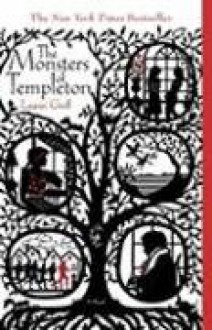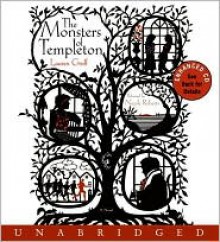
When I picked this up, I didn't quite realize that it was intended to be Literature. I'm a reader of genre books. I devour mystery and fantasy and scifi. I don't believe in "modern classics" and Deep Inner Meanings and books that take themselves seriously. Long story short, I have low tastes, and I like it that way. It is clear that Groff intends her ghosts and monsters to be metaphors, reminiscent of Beloved in Toni Morrison's brilliant book. However, while that plot revolves around Beloved, while her recalcitrance and her voracious appetite and her consuming desires open new perspectives onto the theme of the narrative, Groff's monster and ghosts have no impact on the story itself and seem to exist only as clumsy and blatant metaphors. The monster is, to my mind, merely a tremendous conceit, a garish pointer to all the oh-so-significant symbolism of it all.
I'm not forgiving towards literary fiction and it's entirely possible I've missed the whole Literary-ness of the enterprise.
**WARNING: REVIEW IS CRANKY, UNKIND, AND POTENTIALLY QUITE UNFAIR.**
Since I tend to read genre fiction, I have certain expectations. For example, I expect books to have a certain amount of plot, and I expect plots to have a certain amount of logic. Monsters of Templeton does indeed have a plot; it's the logic that is rather more problematic. The story begins when our narrator, Wilhemina "Willie" Temple, returns to her hometown, fearing that an ill-judged affair with her professor has left her pregnant. She is taken aback to discover that her ex-hippie mother, Vivianne "Vi" Temple, has converted to Christianity[1], Vi decides that confession is good for the soul and blurts that her previous story of a free-love conception and 10.5 month pregnancy was a lie and that Willie's father is actually a resident of Templeton. However, Vi won't give any more details, and, in lieu of a wage-earning job, Willie sets herself the task of finding her father. As she explains,
"[Vi] could've told me who my father was easily, but I needed to know the precise weight of what my family carried; I needed to work for my redemption."
Personally, I find the rationale illogical and contrived; outside of plot necessity, why would Vi encourage Willie to find her father, yet refuse to just tell her?
Willie's research is occasionally interrupted by sporadic worries about her best friend, who is slowly dying of lupus on the other side of the country. One would think that it would be nice for Willie to help care for her friend rather than collapsing in self-indulgent pity-fests, but conveniently, she and her friend mutually agree that Willie is "such a mess" that she needs to figure out who her father is before she is "able" to assist her ailing friend. Again, I can see why the plot required that Willie be relieved of all responsibility, but while Willie's friend may be more forgiving, I have little sympathy for a character who drowns herself in her own selfish, self-centered self-pity.
In fact, I found Willie unlikable throughout the narrative. It's a personal foible, but I can't really warm to a woman who labels a jealous wife "The Castrating Bitch," carries on an affair with TCB's husband, and utterly fails to see the hypocrisy of her position. I'm also unmoved by Willie's "amusing" little attempt to run over the wife with a plane. Not to put too fine a spin on it, I think Willie is an entitled, egotistical, selfish, self-obsessed [bleep].
The narrative interleaves the stories of several generations, with each segment told in first person via journals, letters, etc. Unfortunately, I think Groff epically fails to construct unique voices for her characters. Every single narrator, independent of the generation, gender, or general gestalt, has the same voice. The themes and events, including the obsession with pregnancy, are also surprisingly uniform. The sheer number of illegitimate children strained both patience and credulity. Not only is the rhythm and imagery and sentence structure indistinguishable, but even the vocabularies fail to reflect the character's past. For instance, the non-native-speaking slave women and Native American characters effortlessly use words such as "jostling", "prying", and "pity." Granted, Groff's style is quite readable, but I think the multiple first-person narrators only showcases the rigid uniformity of her style.
Even the monster had a bit of Logic Fail: given that there should have been at least two generations of monsters over the saga, how could the previous monster's body not have risen far earlier?
(spoiler show)
The overall setting also failed to raise my opinion of the book. The town, its history, and its environs are so strongly based on Cooperstown that I can't give Groff credit for an imagination or rich worldbuilding. Groff even "borrows" the names of author J.F. Temple's (a.k.a. James Fennimore Cooper's) characters such as Natty Bumppoe, and locations such as the Leatherstocking Inn. All the historical sections are "homages" to various authors, including Cooper and Austen. Groff even attempted to ape the whimsy of Cooper or Dickens with character names such as Cinnamon, Ginger, and Piddle, but whimsy quickly becomes painful when it is so forced. I have issues with cut-and-paste jobs: if you want to write fiction, then don't steal your hometown, your hometown's famous author, your hometown's famous author's books and characters, and heaven only knows what else.
And then there's the language. Apparently, if you're of a literary persuasion, the language is rich and smooth and fluid and lyrical and lovely. I thought it was indeed fluid and smooth and quite easy to consume, but also cloying and overblown, with occasional noisome sputterings and a gawdawful aftertaste, rather like that spray cheese that comes in cans[3]. Groff also never allows the reader to infer the speaker, but also limits her dialogue tags to the overworked "said." Writing style is highly subjective and I'm by no means an expert on the difference between poetic and turgid, so here's some examples. Yes, the whole book is like this:
- "I first became aware of the air having changed--there was a slight coolness to it, a sense of damp wool. And then I heard the voice, a deep bass and yet unctuous, singsonglike--like an oiled bassoon."
- "[I] imagined Vivienne Upton filling all of Averell Cottage with her glory, until everything held the color and viscosity of honey in the sun. I held the old packet of letters in my hand and imagined Vi filling all of Lake Street with her goodness, then pouring and pouring until she filled all of Templeton, entire."
- "And then his big man's body was leaning against mine, pressing my body into the door. And his breath was near my face, then his face was near my face, then his lips near my lips and he was kissing me. My lips were numb, but even so, it was true what they said: Felch was a killer kisser. Lips soft and full. Tongue just forceful enough. I closed my eyes because everything was swimming before me and in the dark of my eyelids, I forgot where I was, Templeton fell away, Averell Cottage fell away, the long, strange day fell away, and there I was nowhere but inside my skin, and I was warming up, warming perceptibly under his hands and his mouth, hands down the length of my bare thighs, the door hard on my back..."[2]
- "And so though the lake looks all pretty and simple and almost blank now that Glimmey's gone, there's some sort of menace, I think, just lurking there. It's very, very scary."
- "Below our feet, there will be swimming a white monster, a beautiful thing, brushing its back on our feet, young and naughty."
There's also humour but it felt forced to me. Take, for example, a conversation after a pen explodes (improbably) all over Willie's face:
"Oh, yes," I said. "It's a medical condition. Unfortunate, really. Sometimes my cynicism about this big ugly world of ours builds up pressure and bursts all over me. Nothing I can do. Sorry."
"Oh," said Peter Lieder. "I, too, suffer from explosapenitis."
Hilarious. My sides are splitting.
Groff isn't a scientist and isn't a historian, and I have to say, I could tell. At one point, Willie asks,"Why, I always wonder, do scientists believe that unintelligibility equals intelligence?" Answer: they don't. They do, however, believe in precision of language and absence of hyperbolic phrasing and adjective-stuffed similes such as:
- "Grief woke and stretched like a cat in me"
- "Our bodies tense as taut rubber bands"
- "Tightening his fists into dangerous mallets"
- "It was his silky erection sliding across my thigh now."
- "I imagined Sully in the cold San Francisco summer night, the Coit Tower bright and phallic beside him."
- "The congregation's breath rose from our bodies, tethered to us like souls."
And then there's the offenses towards the English language:
- "The phone in my bedroom rang once more. I felt sober, old, and went to pick it up."
- "I felt tears in my voice" (Don't you mean "heard tears in my voice" or "felt tears in my throat"?)
- "[He] trembled the ground." (I checked, and as far as I can see, the ground can tremble, and you can cause the ground to tremble, but you cannot "tremble the ground.")
- "[I] began to speak so quickly my words tumbled over one another like wavelets." (They don't.)
- "Split one of his teeth in two." (I'm sorry, did you mean "chip"? Because you can chip a tooth. You can't randomly "split" one in two.)
Overall, while Groff does have both talent and potential, I think the book sinks under the weight of its own self-conscious pretensions. I found the language to be overwrought, clumsy, and contrived. Groff tried to shoehorn Deep Inner Meaning into as many commonplace interactions as possible, but it left the writing packed with overstatement and blatant metaphors. I think Groff pushed the imagery, the themes of monsters within us, so earnestly and with such self-importance that she put plot before people and lost the soul of her story.
On the other hand, it might just be that I don't do well with literary fiction and should go back to my pleasantly pedestrian pulp.
One of the two.
[1] Apparently some evangelical protestant group, despite the author's repeated references to crucifixes.
[2]The sentence continues onwards for about a paragraph, but I'm too lazy to keep typing. You get the gist.
[3]See, Ms. Groff? Those similes don't require talent. Just disregard for reader patience and/or sanity.


 Log in with Facebook
Log in with Facebook 








